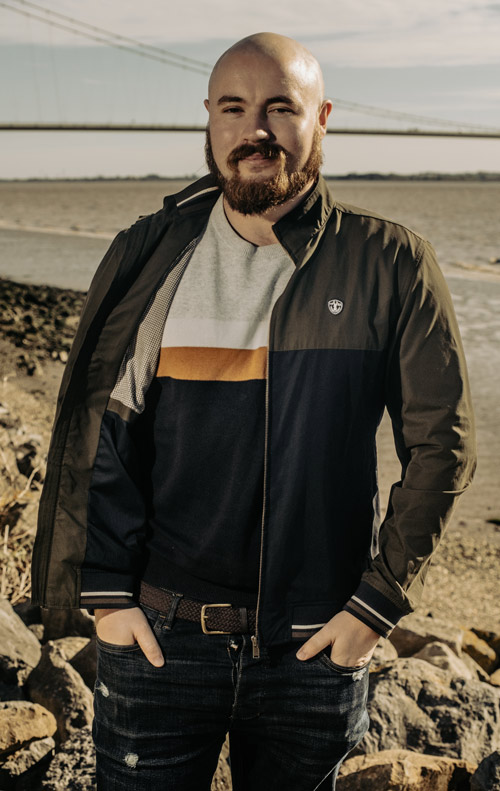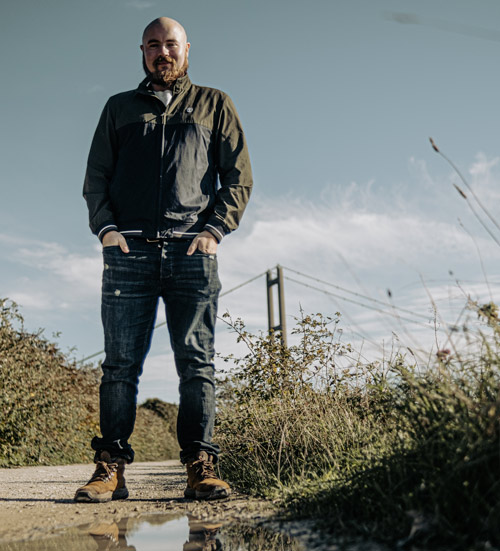
OUR STORY 2008 - 2023

Luke Danaher
Favourite moment: Meeting my friend Jack. I started a water fight with him. At first I thought I’d made a mistake and I’d upset him, but we ended up laughing so much. We’re still like brothers.
The greatest lesson learned from Freedom Road: Only to be concerned with the things that are in my control because I can only change what is in my control.
Freedoms gained: To be able to talk to people. I'd always have to write things down or just nod my head, now I can hold conversations.
Luke’s Story
In applied maths there is a concept that explains metric spaces giving the world an understanding of distance between objects. Within this concept sit open and closed neighbourhoods. It’s abstract to most people but to Luke Danaher, who has a first class honours degree and a masters in mathematics, maths has always been a form of expression, a second language. When asked to describe himself as a maths problem he says: “I started off as a closed set, really. I wouldn’t let anyone in. I didn't let anyone else in my neighbourhood.” He has Asperger’s Syndrome, and this coupled with his love of maths could paint a picture of Luke as some kind of recluse who retreats into his mind. And when he was 11, he did fit that profile.
When he began secondary school he started covering his face with his hand. He held it there like a guard, barely letting it waver for four years. Luke was so troubled at this time that his mum got him a social worker and he was invited to join Freedom Road Creative Arts, the place where Luke began a slow and winding journey to the person he is today. At 23 years old he is embarking on teacher training, but he has had to change the metric space he puts between himself and others to reach this point. Luke says: “When I joined Freedom Road I began letting people in my neighbourhood and reducing the metric space. With that you become an open set, instead of a closed set. In my case, over time my hand started gradually moving away from my face and I think it just went from there.” Luke no longer seems to fit the mainstream image of a man with Asperger’s. He is open, smiles warmly and talks freely about his life.
Luke’s life aged between 11 and 15 was a strange mix of light and shade. At school he had a dedicated teaching assistant who protected him and helped him navigate the horrors of the day-to-day (Luke struggled with noise and people). He lived with his mum and sister. At home he also struggled with life because of his condition and he feels guilty about the impact his Asperger’s had on his family. He says: “I was diagnosed at some point between being three and five, but when I left primary school I think my world just came in on me. Honestly, I think I felt crushed. I think it’s because at the time I just wasn't sure how to express myself really and I just blocked myself. I used my hand to block myself so I didn’t have to let anyone in. I really didn’t want to let anyone in at all.”
So, it seems like a strange choice for a child who was socially paralysed to join a performing arts group. But after he was introduced to Ian Bolton, Luke says he had no reservations about turning up every Thursday. Luke attributes this to Ian. He says: “He was very open, and that encouraged me to trust him. I think my openness stems from his openness and our first meeting.”
Then every Thursday, and eventually every Saturday, Luke would go to Freedom Road, and he felt less and less different. He explains: “I realised everybody there had problems. They might not be the same as mine but I felt less alone because, we all had difficulties”. Together Luke and the other Freedom Roaders worked on productions and themselves with the help of Ian and Iain and the other staff. Luke became able enough to perform on stage in a group. He says: “I can honestly say that I was the most terrified I have ever been in my life, but I did it.” Sometimes when he performed he managed to remove his hand from his face, but not always. He was writing songs along with others and this enabled him to gain the skill of expressing himself without having to talk - a massive stepping stone for Luke as he then used the tool of writing down his thoughts in school. He says: “When I couldn’t speak, which happened a lot, I would just write notes. It really helped me.”
Then came a life-changing moment for Luke. He was probably around the age of 14 or 15, but he can’t be certain. He began to learn the guitar. He says: “I think it was my idea to learn. I think the fact I went to Freedom Road to begin with made me think: Why can't I make a choice to give this a go? I think I thought: I've done the hard work, why can’t I start something new with Freedom Road?” Naturally playing the guitar meant Luke could no longer make a physical barrier between himself and the world by guarding his face. He says it unnerved and frightened him, but he was enjoying it so much that he gradually shifted into a new phase that enabled him to drop the guard at school and in other walks of life. It’s remarkably simple but it took Luke courage and encouragement to get to this point. Luke says: “I thought I was a lost cause before I started Freedom Road. I really did. I felt absolutely hopeless and helpless and in a very bad place.”
Remarkably, he says that his very first interaction with Ian Bolton gave him the idea he wasn’t a lost cause. He can’t really explain this but he does say that Ian is like a “genie” who is able to get the best from him. He has been a mentor to him. Luke’s dad left when he was born and in the early part of his life Luke found it hard to shake off the idea that he was somehow responsible for his father leaving. He has never really been able to articulate these thoughts and has instead chosen to come to terms with them alone.
He says his father once phoned his family landline when he was about seven years old. Luke says he instantly felt as though he knew the man from his voice before he actually knew who he was. It was a strange experience that troubled Luke for years. He explains: “All of a sudden out of nowhere he was saying these things like ‘I'm going to come and see you. You know, I'm your father or I'm always going to be there for you’. But it was all rubbish.”
Luke’s father has since died and any ill feelings that Luke held have been put to rest. He explains: “I’m completely over it because I don’t want anything like that to define me or to have an impact on my attitude because it's just wasted energy and time. I cannot change what happened. So, why do I have to stress over it all?” Luke is remarkably measured and able to weigh up his life. He attributes this to the mentoring he has benefitted from at Freedom Road. He believes it has helped to unlock him.
To return to Luke’s idea about neighbourhoods, not only has he been able to let people into his life, he is now able to see into other people’s lives. He explains: “I think. I can see outside myself now. I can think of people other than myself and think about how they feel.” He adds: “I would like to say ‘hats off to Freedom Road’ because they have done that for me. Honestly, I think looking back over the last 10 years, I honestly don't know where my life would have been going if I wasn't referred to that charity. I don’t know if I’d be sitting here at all.”

For more info please find us at:
www.freedomroadcreativearts.com
or on 07921800617
CHILD PROTECTION & SAFEGUARDING CHILDREN POLICY & PROCEDURES
COMPLAINTS PROCEDURE
charity number:1124982
